- Home
- Franklin W. Dixon
The House on the Cliff Page 8
The House on the Cliff Read online
Page 8
“I can open it,” Frank said in Joe’s ear, “but we’d better wait a few minutes.”
“Every second is vital if Dad’s a prisoner,” Joe objected.
Frank was about to accede to his brother’s urging when both boys heard footsteps on the other side of the door. A chill ran down their spines.
“Shall we run?” Joe said fearfully.
“It wouldn’t do us any good. Listen!”
There came a queer shuffling sound and a sigh from somewhere beyond the door. That was all.
“Someone’s in there,” Frank breathed. Joe nodded in the darkness.
The boys did not know what to do. The gang might have posted a sentry. If there was only one, the Hardys might be able to jump the man and disarm him. However, they probably could not do it without making some noise and attracting the attention of the rest of the smugglers.
Frank and Joe gritted their teeth. They couldn’t give up now!
As they were trying to decide how to proceed, the situation took an unexpected turn. A door slammed in the distance. Then came the murmur of voices and the sound of advancing footsteps.
“This nonsense has gone far enough,” a man said angrily. “He’ll write that note at once, or I’ll know the reason why.”
The boys started. The voice was that of the man who had ordered them to leave the pond during the afternoon.
“That’s right, chief!” another voice spoke up. “Make him do as you say and get the heat off us until we’ve got all the loot moved.”
“If he doesn’t write it, he’ll never get out of here alive,” the first man promised coldly.
Instantly Frank and Joe thought of the note their mother had received. Was the man these smugglers were talking about their father? Or was he someone else—maybe Jones, who was to be forced to obey them or perhaps lose his life?
The speakers went a short distance beyond the door behind which Frank and Joe were standing. Then they heard the click of a switch. A faint beam of yellow light shone beneath the door. The brothers figured there was a corridor beyond and three or four men had entered a room opening from it.
“Well, I see you’re still here,” said the man who had been addressed as chief. “You’ll find this an easier place to get into than out of.”
A weary voice answered him. The tones were low, so the boys pressed closer to the door. But try as they might, they could not distinguish the words.
“You’re a prisoner here and you’ll stay here until you die unless you write that note.”
Again the weary voice spoke, but the tones were still so indistinct that the boys could not hear the answer.
“You won’t write it, eh? We’ll see what we can do to persuade you.”
“Let him go hungry for a few days. That’ll persuade him!” put in one of the other men. This brought a hoarse laugh from his companions.
“You’ll be hungry enough if you don’t write that letter,” the chief agreed. “Are you going to write it?”
“No,” the boys barely heard the prisoner answer.
The chief said sourly, “You’ve got too much on us. We can’t afford to let you go now. But if you write that letter, we’ll leave you some food, so that you won’t starve. You’ll break out eventually, but not in time to do us any harm. Well, what do you say? Want some food?”
There was no reply from the prisoner.
“Give his arm a little twist,” suggested one of the smugglers.
At this the Hardys’ blood boiled with rage. Their first impulse was to fling open the door and rush to the aid of the person who was being tormented. But they realized they were helpless against so many men. Their only hope lay in the arrival of the Coast Guard men, but they might come too late!
“Chief, shall I give this guy the works?” one of the smugglers asked.
“No,” the leader answered quickly. “None of that rough stuff. We’ll do it the easy way—starvation. I’m giving him one more chance. He can write that note now or we’ll leave him here to starve when we make our getaway.”
Still there was no reply.
To Frank’s and Joe’s ears came a scraping sound as if a chair was being moved forward.
“You won’t talk, eh?” The leader’s voice grew ugly.
There was a pause of a few seconds, then suddenly he shouted, “Write that note, Hardy, or you’ll be sorry—as sure as my name’s Snattmanl”
CHAPTER XIV
Captured
JOE gave a start. “It is Dad!” he whispered hoarsely. “He found the smugglers’ hide-out!”
Frank nudged his brother warningly. “Not so loud.”
The boys’ worst fears were realized—their father was not only a prisoner of the smugglers, but also his life was being threatened!
“Write that note!” Snattman demanded.
“I won’t write it,” Fenton Hardy replied in a weak but clear voice.
The chief persisted. “You heard what I said. Write it or be left here to starve.”
“I’ll starve.”
“You’ll change your mind in a day or two. You think you’re hungry now, but wait until we cut off your food entirely. Then you’ll see. You’ll be ready to sell your soul for a drop of water or a crumb to eat.”
“I won’t write it.”
“Look here, Hardy. We’re not asking very much. All we want you to do is write to your wife that you’re safe and tell her to call off the police and those kids of yours. They’re too nosy.”
“Sooner or later someone is going to trace me here,” came Mr. Hardy’s faint reply. “And when they do, I can tell them enough to send you to prison for the rest of your life.”
There was a sudden commotion in the room and two or three of the smugglers began talking at once.
“You’re crazy!” shouted Snattman, but there was a hint of uneasiness in his voice. “You don’t know anything about me!”
“I know enough to have you sent up for attempted murder. And you’re about to try it again.”
“You’re too smart, Hardy. That’s all the more reason why you’re not going to get out of here until we’ve gone. And if you don’t co-operate you’ll never make it. Our next big shipment’s coming through tonight, and then we’re skipping the country. If you write that letter, you’ll live. If you don’t, it’s curtains for you!”
Frank and Joe were shaken by the dire threats. But they must decide whether to go for help, or stay and risk capture and try to rescue their father.
“You can’t scare me, Snattman,” the detective said. “I have a feeling your time is up. You’re never going to get that big shipment.”
The detective’s voice seemed a little stronger, the boys felt.
Snattman laughed. “I thought you were smart, but you’re playing a losing game, I warn you. And how about your family? Are you doing them a service by being so stubborn?”
There was silence for a while. Then Fenton Hardy answered slowly:
“My wife and boys would rather know that I died doing my duty than have me come back to them as a protector of smugglers and criminals.”
“You have a very high sense of duty,” sneered Snattman. “But you’ll change your mind. Are you thirsty?”
There was no reply.
“Are you hungry?”
Still no answer.
“You know you are. And it’ll be worse. You’ll die of thirst and starvation unless you write that note.”
“I’ll never write it.”
“All right. Come on, men. We’ll leave him to himself for a while and give him time to think about it.”
Frank squeezed Joe’s arm in relief and exhilaration. There was still a chance to save their father!
Footsteps echoed as Snattman and the others left the room and walked through the corridor. Finally the sounds died away and a door slammed.
Joe made a move toward the door, but Frank held him back. “We’d better wait a minute,” he cautioned, “They may have left someone on guard.”
The boys stood still, listening
intently. But there were no further sounds from beyond the door. At length, satisfied that his father had indeed been left alone, Frank felt for the knob.
Noiselessly he opened the door about an inch, then peered into the corridor which was dimly lighted from one overhead bulb. There was no sign of a guard.
Three doors opened from the corridor—two on the opposite side from where the brothers were standing and another at the end.
The passage was floored with planks and had a beamed ceiling like a cellar. Frank and Joe quickly figured where their father was and sped across the planks to the room. They pushed open the door of the almost dark room and peered inside. There was a crude table and several chain. In one corner stood a small cot. On it lay Fenton Hardy. He was bound hand and foot to the bed and so tightly trussed that he was unable to move more than a few inches in any direction. He was flat on his back, staring up at the ceiling of his prison. On a chair beside the cot was a sheet of paper and a pencil, evidently the materials for the letter Snattman had demanded he write.
“Dad!” Frank and Joe cried softly.
The detective had not heard the door open, but now he looked at his sons in amazement and relief. “You’re here!” he whispered. “Thank goodness!”
The boys were shocked at the change in their father’s appearance. Normally a rugged-looking man, Fenton Hardy now was thin and pale. His cheeks were sunken and his eyes listless.
“We’ll have you out of here in a minute,” Frank whispered.
“Hurry!” the detective begged. “Those demons may be back any minute!”
Frank pulled out his pocketknife and began to work at the ropes that bound his father. But the knife was not very sharp and the bonds were thick.
Joe discovered that he did not have his knife with him. “It probably slipped out of my pocket when we undressed on the Napoli,” he said.
“Mine’s gone too,” Mr. Hardy told them. “Snattman took everything I had in my pockets, including concentrated emergency rations. Have you anything sweet with you?”
Joe pulled out the candy bar from his pocket and held it, so Mr. Hardy could take a large bite of the quick-energy food. Meanwhile, his eyes roamed over the room in search of something sharp which he might use to help Frank with the ropes. He saw nothing.
Mr. Hardy finished the candy bar, bite by bite. Now Joe started to help Frank by trying to untie the knots. But they were tight and he found it almost impossible to loosen them.
Minutes passed. Frank hacked at the ropes, but the dull blade made little progress. Joe worked at the obstinate knots. Fenton Hardy could give no assistance. All were silent. The only sound was the heavy breathing of the boys and the scraping of the knife against the ropes.
At last Frank was able to saw through one of the bonds and the detective’s feet were free. His son pulled the ropes away and began to work on the ones that bound his father’s arms. As he reached over with the knife there came a sound that sent a feeling of terror through the Hardys.
It was a heavy footstep beyond the corridor door. Someone was coming back!
Frank worked desperately with the knife, but the ropes still held stubbornly. The dull blade seemed to make almost no impression. But at last a few strands parted. Finally, with Fenton Hardy making a mighty effort and Joe clawing at the rope with his fingers, it snapped.
The detective was free!
But the footfalls of the approaching smuggler came closer.
“Quick!” Frank whispered, as he flung the ropes aside.
“I—I can’t hurry!” Mr. Hardy gasped. “I’ve been tied up so long my feet and legs are numb.”
“But we’ve got to hurry, Dad!” Frank said excitedly. “See if you can stand up.”
“I’ll—I’ll do my best,” his father replied, as the boys rubbed his legs vigorously to restore full circulation.
“We must run before those crooks come!” Joe said tensely.
Fenton Hardy got to his feet as hastily as he could. But when he stood up, the detective staggered and would have fallen if Frank had not taken his arm. He was so weak from hunger that a wave of dizziness had come over him. He gave his head a quick shake and the feeling passed.
“All right. Let’s go,” he said, clinging to both boys for support.
The three hastened out the door of the room and across the corridor to the cave. As they entered it, Mr. Hardy’s knees buckled. In desperation his sons picked him up.
“You go on,” he whispered. “Leave me here.”
“I’m sure all of us can make it,” Joe said bravely.
They reached the far door, but the delay had been costly. Just as Frank opened it, clicking off his flashlight, the corridor door was flung open and the ceiling light snapped on.
Frank leaped directly at the smuggler
Frank and Joe had a confused glimpse of the dark man whom they had seen at the pond that afternoon. Snattman! Two rough-looking companions crowded in behind him.
“What’s going on here?” Snattman exclaimed, apparently not recognizing the group for a moment.
“It’s the Hardys!” one of the other men cried out
The fleeing trio started down the steps but got no farther than the landing when the smugglers appeared at the stairway and rushed down after them.
“Stop!” cried Snattman, jumping down the last three steps and whipping an automatic from his hip pocket. The place was flooded with light.
As Snattman drew closer, Frank crouched for a spring, then leaped directly at the smuggler. He struck at the man’s wrist and the revolver flew out of his grasp. It skidded across the landing and clattered down the steps. Frank closed in on the man. Snattman had been taken completely by surprise. Before he could defend himself, Frank forced him against the wall.
Joe, in the meantime, with a swift uppercut had kayoed one of the other men. And Mr. Hardy, whose strength had partially returned, was battling the third as best he could.
But at this moment the boys saw their father’s adversary dodge to the wall and press a button. In an instant an alarm bell sounded in the corridor. Within seconds a new group of Snattman’s gang appeared. As some held drawn revolvers, others overpowered the three Hardys.
In the face of the guns, father and sons were forced to surrender and return to the room where Mr. Hardy had been held captive before.
Within five minutes Fenton Hardy was bound again to the cot, while Frank and Joe, trussed up and unable to move, were tied to two chairs.
CHAPTER XV
Dire Threats
SNATTMAN, once he had recovered from his first consternation and surprise at finding the Hardy boys in the underground room, was in high good humor. He turned to his men.
“Just in time,” he gloated, rubbing his hands together in satisfaction. “If we hadn’t come here when we did, they’d have all escaped!”
The Hardy boys were silent, sick with despair. They had been sure they were going to succeed in rescuing their father and now the three of them were prisoners of the smuggling gang.
“What are we goin’ to do with these guys?” asked one of the men.
The voice sounded familiar to the boys and they looked up. They were not surprised to see that the man was the red-haired one they had met at the Pollitt place when Frank had discovered his father’s cap.
“Do with them?” Snattman mused. “That’s a problem. We’ve got three on our hands now instead of one. Best thing is to leave them all here and lock the door.”
“And put gags in their traps,” suggested a burly companion.
Red objected. “As long as the Hardys are around here, they’re dangerous. They almost got away this time.”
“Well, what do you suggest?”
“We ought to do what I wanted to do with the old man in the first place,” Red declared doggedly.
“You mean get rid of them?” Snattman asked thoughtfully.
“Sure. All of them!”
“Well—” Snattman gazed at Mr. Hardy with a sinister look.
; “I should think you have enough on your conscience already, Snattman!” the detective exclaimed. “I don’t expect you to let me go,” he added bitterly. “But release my boys. They haven’t done anything but try to rescue their father. You’d do the same thing yourself.”
“Oh yeah?” Snattman sneered. “Don’t bother yourself about my conscience. Nobody—but nobody ever stands in my way.
“As to letting these boys go, what kind of a fool do you take me for?” Snattman shouted. “If you three are such buddies, you ought to enjoy starving together.”
The smuggler laughed uproariously at what he considered a very funny remark.
Frank’s and Joe’s minds were racing with ideas. One thing stood out clearly. Snattman had said the Hardys almost escaped. This meant that no one was guarding the secret entrance!
“If we can only hold out a while,” they thought, “the Coast Guard will arrive. There’ll be nobody to stop them from coming up here.”
Then, suddenly, a shocking possibility occurred to the boys. Suppose the Coast Guard could not find the camouflaged door opening from the pond!
During the conversation four of the smugglers had been whispering among themselves in the corridor. One of them now stepped into the room and faced Snattman.
“I’d like a word with you, chief,” he began.
“What is it now?” The smuggler’s voice was surly.
“It’s about what’s to be done with the Hardys, now that we’ve got ‘em,” the man said hesitantly. “It’s your business what you do to people who make it tough for you when you’re on your own. But not in our gang. We’re in this for our take out of the smugglin’, and we won’t stand for too much rough stuff.”
“That’s right!” one of the other men spoke up.
“Is that so?” Snattman’s upper lip curled. “You guys are gettin’ awful righteous all of a sudden, aren’t you? Look out or I’ll dump the lot of you!”
“Oh, no, you won’t,” replied the first man who had addressed him. “We’re partners in this deal and we’re goin’ to have our full share of what comes in. We ain’t riskin’ our lives for love, you know.”
“We’ve got another idea about what to do with these three prisoners,” a third smuggler spoke up. “I think it’s a good one.”

 The Great Pumpkin Smash
The Great Pumpkin Smash Who Let the Frogs Out?
Who Let the Frogs Out? Return to Black Bear Mountain
Return to Black Bear Mountain A Treacherous Tide
A Treacherous Tide Bug-Napped
Bug-Napped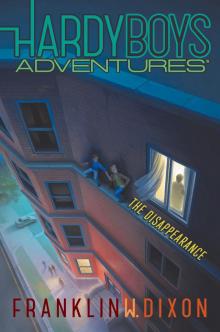 The Disappearance
The Disappearance Sea Life Secrets
Sea Life Secrets The Mystery of the Chinese Junk
The Mystery of the Chinese Junk A Skateboard Cat-astrophe
A Skateboard Cat-astrophe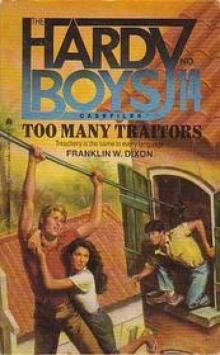 Too Many Traitors
Too Many Traitors Galaxy X
Galaxy X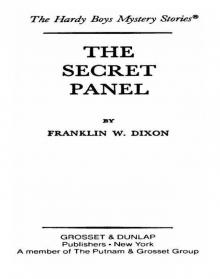 The Secret Panel
The Secret Panel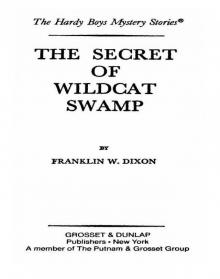 The Secret of Wildcat Swamp
The Secret of Wildcat Swamp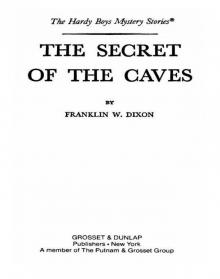 The Secret of the Caves
The Secret of the Caves The Caribbean Cruise Caper
The Caribbean Cruise Caper Without a Trace
Without a Trace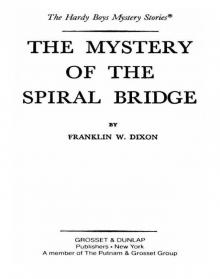 The Mystery of the Spiral Bridge
The Mystery of the Spiral Bridge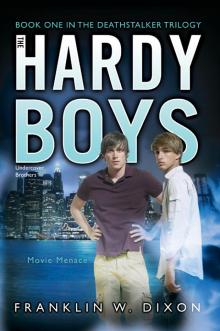 Movie Menace
Movie Menace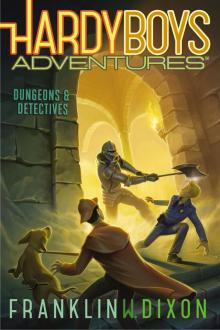 Dungeons & Detectives
Dungeons & Detectives Water-Ski Wipeout
Water-Ski Wipeout The Case of the Psychic's Vision
The Case of the Psychic's Vision X-plosion
X-plosion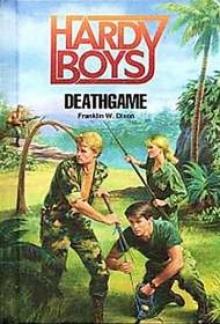 Deathgame
Deathgame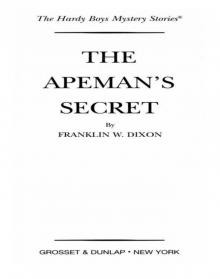 The Apeman's Secret
The Apeman's Secret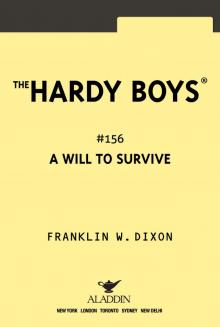 A Will to Survive
A Will to Survive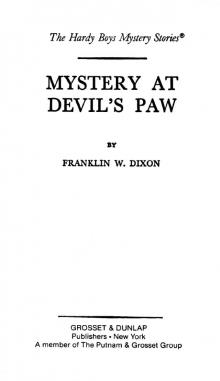 Mystery at Devil's Paw
Mystery at Devil's Paw Blood Money
Blood Money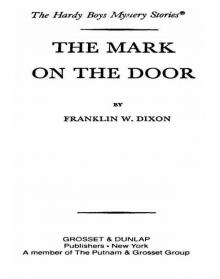 The Mark on the Door
The Mark on the Door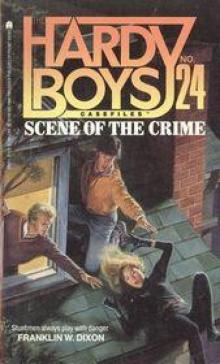 Scene of the Crime
Scene of the Crime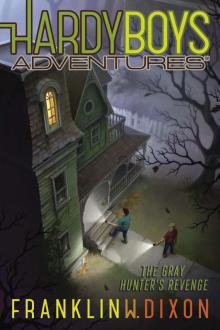 The Gray Hunter's Revenge
The Gray Hunter's Revenge Stolen Identity
Stolen Identity The Mummy's Curse
The Mummy's Curse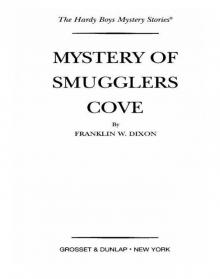 Mystery of Smugglers Cove
Mystery of Smugglers Cove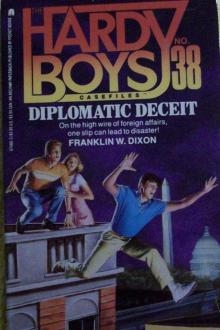 Diplomatic Deceit
Diplomatic Deceit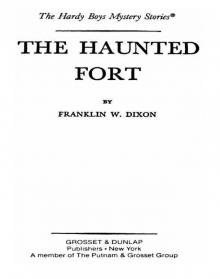 The Haunted Fort
The Haunted Fort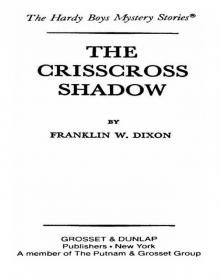 The Crisscross Shadow
The Crisscross Shadow Secret of the Red Arrow
Secret of the Red Arrow Trial and Terror
Trial and Terror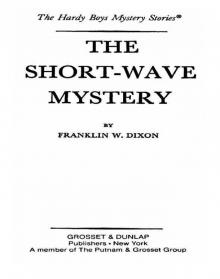 The Short-Wave Mystery
The Short-Wave Mystery The Spy That Never Lies
The Spy That Never Lies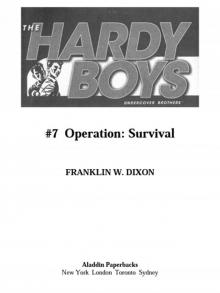 Operation: Survival
Operation: Survival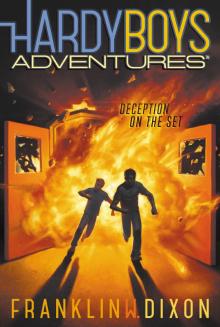 Deception on the Set
Deception on the Set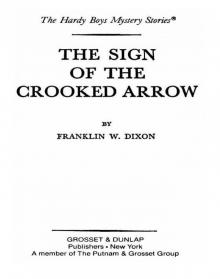 The Sign of the Crooked Arrow
The Sign of the Crooked Arrow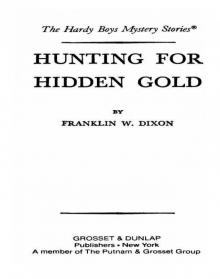 Hunting for Hidden Gold
Hunting for Hidden Gold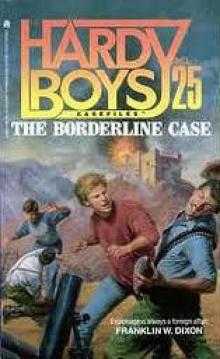 Disaster for Hire
Disaster for Hire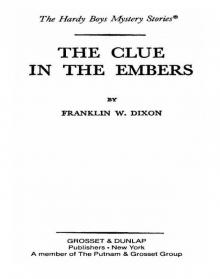 The Clue in the Embers
The Clue in the Embers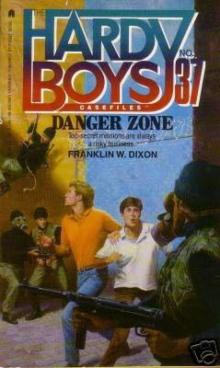 Danger Zone
Danger Zone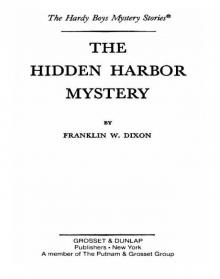 The Hidden Harbor Mystery
The Hidden Harbor Mystery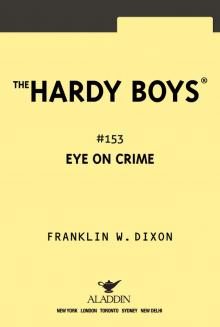 Eye on Crime
Eye on Crime A Game Called Chaos
A Game Called Chaos The Bicycle Thief
The Bicycle Thief The Missing Playbook
The Missing Playbook Survival Run
Survival Run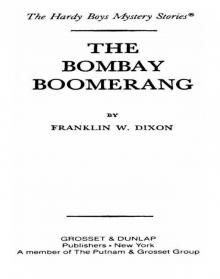 The Bombay Boomerang
The Bombay Boomerang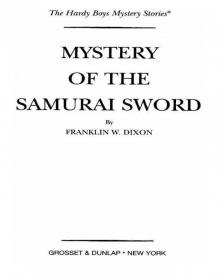 Mystery of the Samurai Sword
Mystery of the Samurai Sword Burned
Burned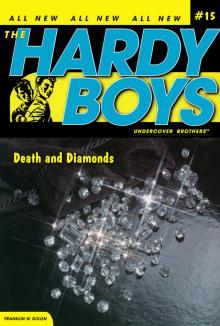 Death and Diamonds
Death and Diamonds Murder at the Mall
Murder at the Mall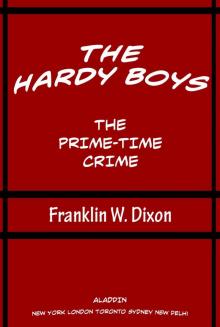 The Prime-Time Crime
The Prime-Time Crime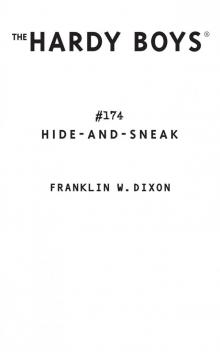 Hide-and-Sneak
Hide-and-Sneak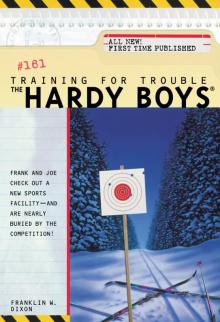 Training for Trouble
Training for Trouble Trouble in Paradise
Trouble in Paradise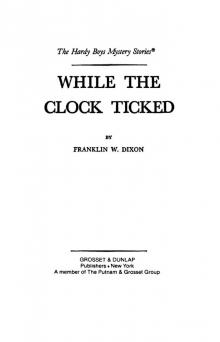 While the Clock Ticked
While the Clock Ticked The Alaskan Adventure
The Alaskan Adventure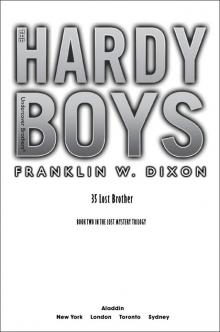 The Lost Brother
The Lost Brother Tunnel of Secrets
Tunnel of Secrets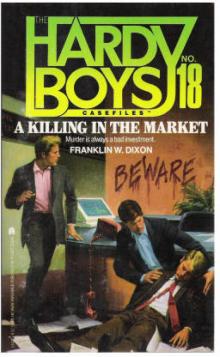 A Killing in the Market
A Killing in the Market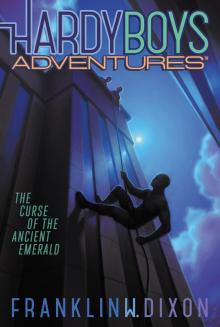 The Curse of the Ancient Emerald
The Curse of the Ancient Emerald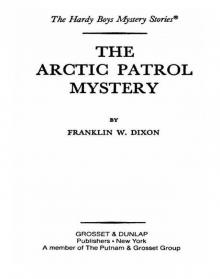 The Arctic Patrol Mystery
The Arctic Patrol Mystery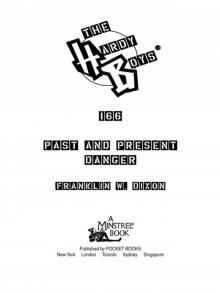 Past and Present Danger
Past and Present Danger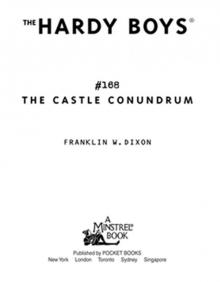 The Castle Conundrum (Hardy Boys)
The Castle Conundrum (Hardy Boys)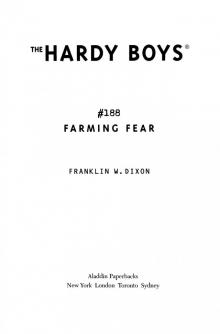 Farming Fear
Farming Fear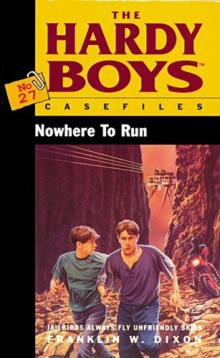 Nowhere to Run
Nowhere to Run The Secret of the Soldier's Gold
The Secret of the Soldier's Gold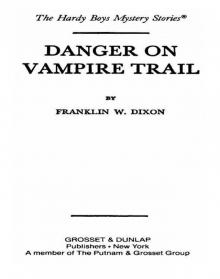 Danger on Vampire Trail
Danger on Vampire Trail The Lure of the Italian Treasure
The Lure of the Italian Treasure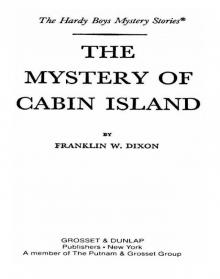 The Mystery of Cabin Island
The Mystery of Cabin Island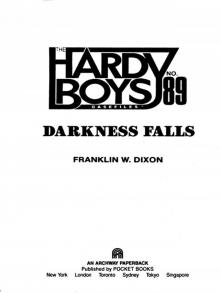 Darkness Falls
Darkness Falls Night of the Werewolf
Night of the Werewolf Danger in the Extreme
Danger in the Extreme The Lazarus Plot
The Lazarus Plot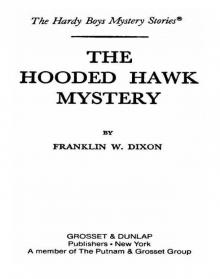 The Hooded Hawk Mystery
The Hooded Hawk Mystery Double Trouble
Double Trouble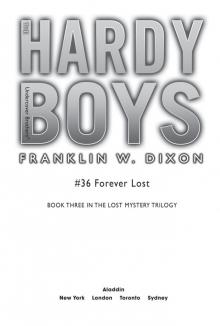 Forever Lost
Forever Lost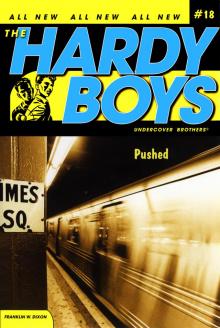 Pushed
Pushed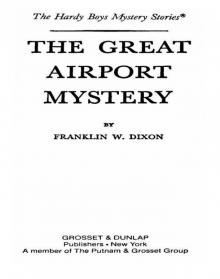 The Great Airport Mystery
The Great Airport Mystery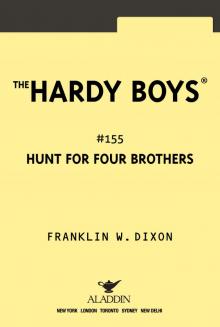 The Hunt for Four Brothers
The Hunt for Four Brothers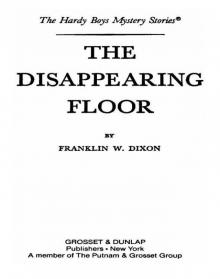 The Disappearing Floor
The Disappearing Floor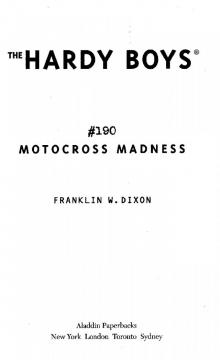 Motocross Madness
Motocross Madness Foul Play
Foul Play High-Speed Showdown
High-Speed Showdown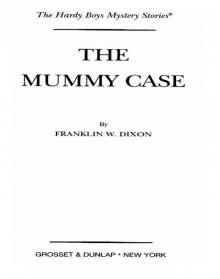 The Mummy Case
The Mummy Case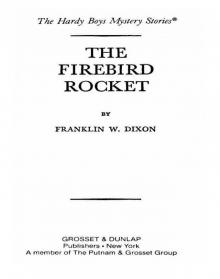 The Firebird Rocket
The Firebird Rocket Trouble in Warp Space
Trouble in Warp Space Ship of Secrets
Ship of Secrets Line of Fire
Line of Fire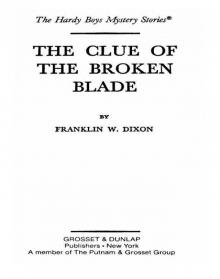 The Clue of the Broken Blade
The Clue of the Broken Blade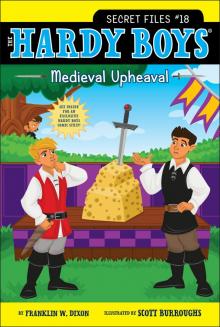 Medieval Upheaval
Medieval Upheaval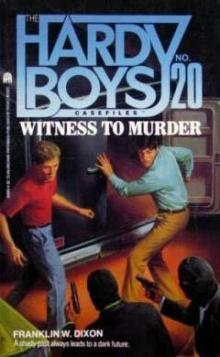 Witness to Murder
Witness to Murder The Giant Rat of Sumatra
The Giant Rat of Sumatra Attack of the Bayport Beast
Attack of the Bayport Beast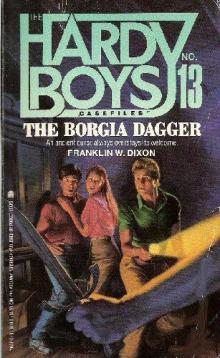 The Borgia Dagger
The Borgia Dagger Scavenger Hunt Heist
Scavenger Hunt Heist No Way Out
No Way Out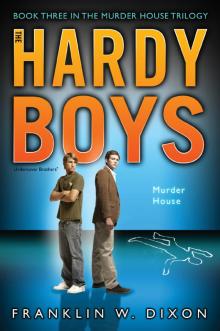 Murder House
Murder House The X-Factor
The X-Factor The Desert Thieves
The Desert Thieves Mystery of the Phantom Heist
Mystery of the Phantom Heist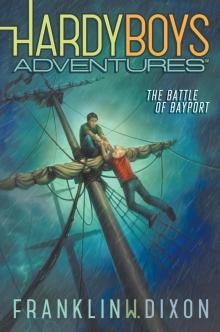 The Battle of Bayport
The Battle of Bayport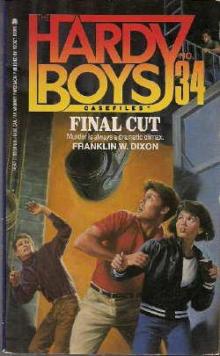 Final Cut
Final Cut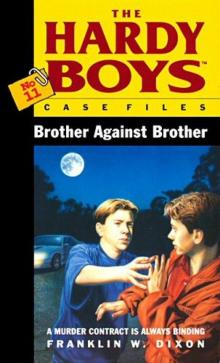 Brother Against Brother
Brother Against Brother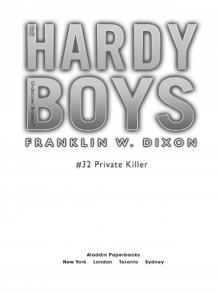 Private Killer
Private Killer The Mystery of the Black Rhino
The Mystery of the Black Rhino Feeding Frenzy
Feeding Frenzy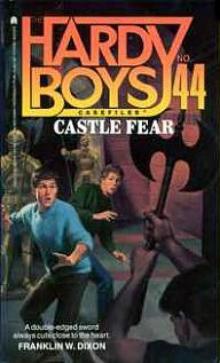 Castle Fear
Castle Fear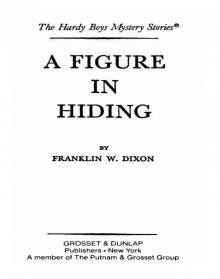 A Figure in Hiding
A Figure in Hiding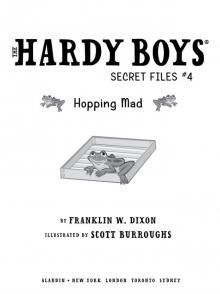 Hopping Mad
Hopping Mad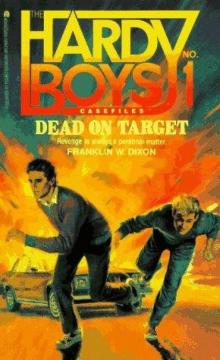 Dead on Target
Dead on Target Skin and Bones
Skin and Bones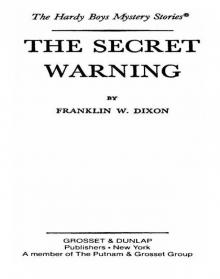 The Secret Warning
The Secret Warning Flesh and Blood
Flesh and Blood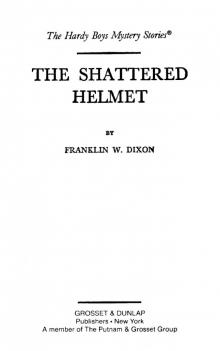 The Shattered Helmet
The Shattered Helmet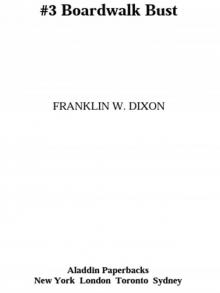 Boardwalk Bust
Boardwalk Bust Terror at High Tide
Terror at High Tide In Plane Sight
In Plane Sight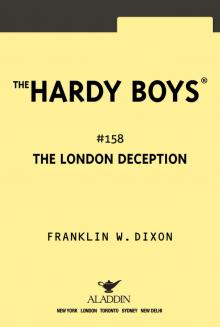 The London Deception
The London Deception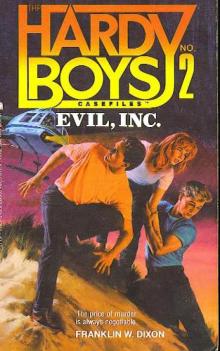 Evil, Inc.
Evil, Inc.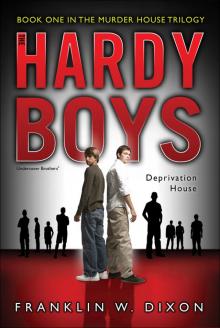 Deprivation House
Deprivation House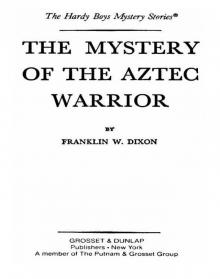 The Mystery of the Aztec Warrior
The Mystery of the Aztec Warrior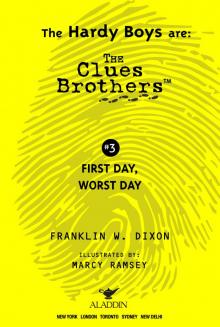 First Day, Worst Day
First Day, Worst Day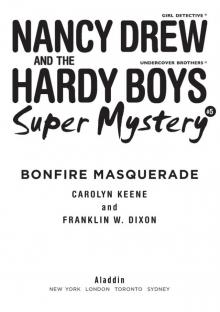 Bonfire Masquerade
Bonfire Masquerade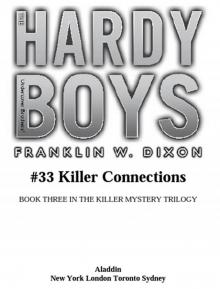 Killer Connections
Killer Connections Strategic Moves
Strategic Moves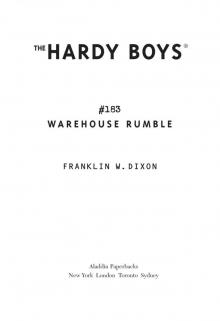 Warehouse Rumble
Warehouse Rumble The Chase for the Mystery Twister
The Chase for the Mystery Twister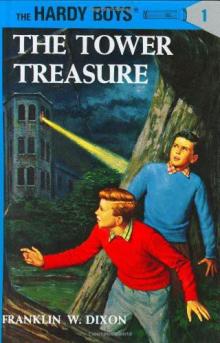 The Tower Treasure thb-1
The Tower Treasure thb-1 The Children of the Lost
The Children of the Lost The Last Laugh
The Last Laugh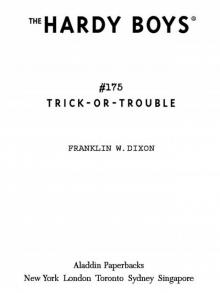 Trick-or-Trouble
Trick-or-Trouble Perfect Getaway
Perfect Getaway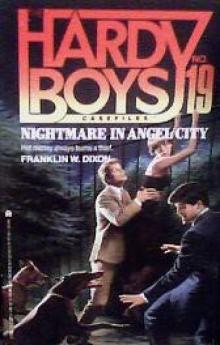 Nightmare in Angel City
Nightmare in Angel City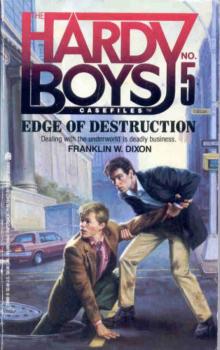 Edge of Destruction
Edge of Destruction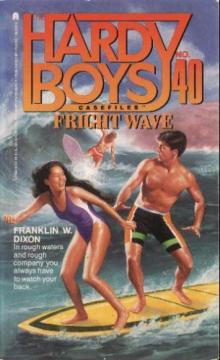 Fright Wave
Fright Wave The Jungle Pyramid
The Jungle Pyramid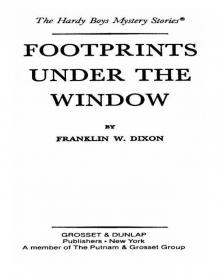 Footprints Under the Window
Footprints Under the Window The Gross Ghost Mystery
The Gross Ghost Mystery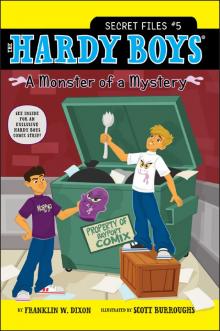 A Monster of a Mystery
A Monster of a Mystery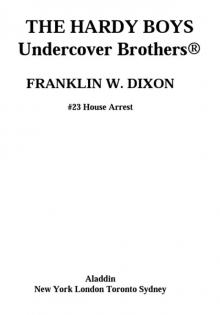 House Arrest
House Arrest Mystery of the Desert Giant
Mystery of the Desert Giant Talent Show Tricks
Talent Show Tricks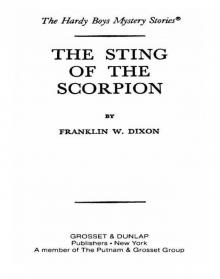 The Sting of the Scorpion
The Sting of the Scorpion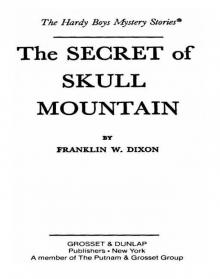 The Secret of Skull Mountain
The Secret of Skull Mountain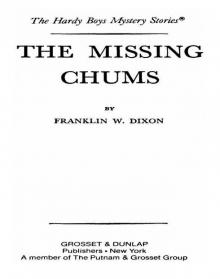 The Missing Chums
The Missing Chums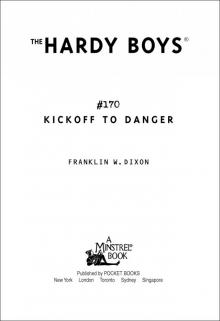 Kickoff to Danger
Kickoff to Danger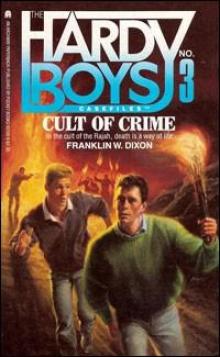 Cult of Crime
Cult of Crime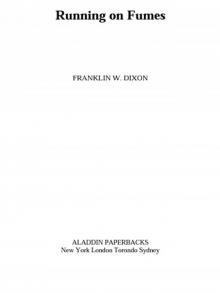 Running on Fumes
Running on Fumes Martial Law
Martial Law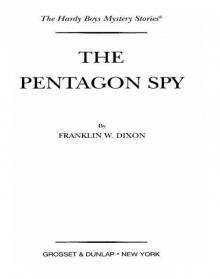 The Pentagon Spy
The Pentagon Spy Hazed
Hazed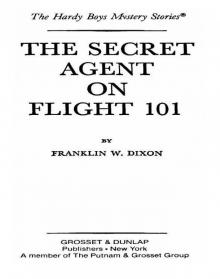 The Secret Agent on Flight 101
The Secret Agent on Flight 101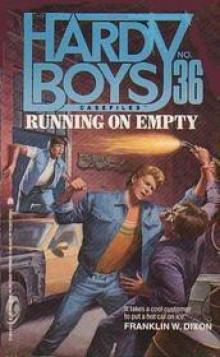 Running on Empty
Running on Empty Top Ten Ways to Die
Top Ten Ways to Die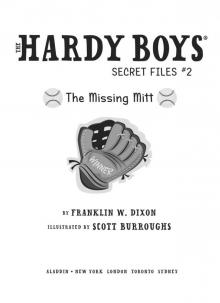 The Missing Mitt
The Missing Mitt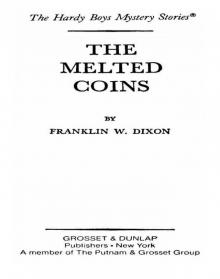 The Melted Coins
The Melted Coins The Rocky Road to Revenge
The Rocky Road to Revenge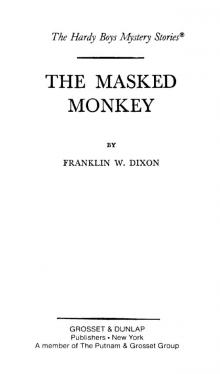 The Masked Monkey
The Masked Monkey Lost in Gator Swamp
Lost in Gator Swamp Extreme Danger
Extreme Danger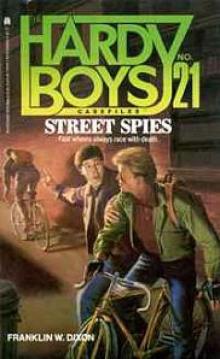 Street Spies
Street Spies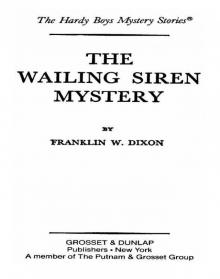 The Wailing Siren Mystery
The Wailing Siren Mystery The Dangerous Transmission
The Dangerous Transmission Hurricane Joe
Hurricane Joe The Crisscross Crime
The Crisscross Crime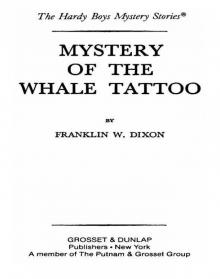 Mystery of the Whale Tattoo
Mystery of the Whale Tattoo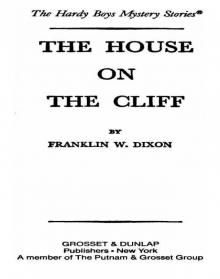 The House on the Cliff
The House on the Cliff Camping Chaos
Camping Chaos Ghost of a Chance
Ghost of a Chance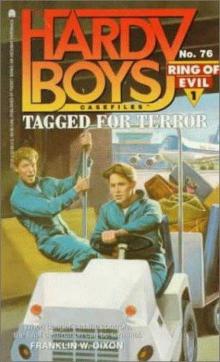 Tagged for Terror
Tagged for Terror Thrill Ride
Thrill Ride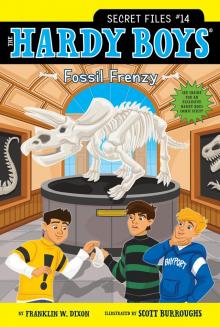 Fossil Frenzy
Fossil Frenzy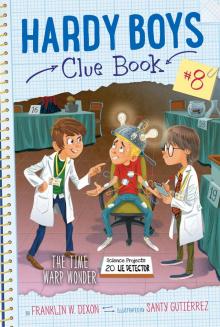 The Time Warp Wonder
The Time Warp Wonder Ghost Stories
Ghost Stories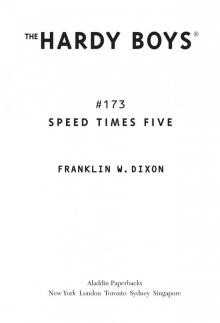 Speed Times Five
Speed Times Five What Happened at Midnight
What Happened at Midnight Three-Ring Terror
Three-Ring Terror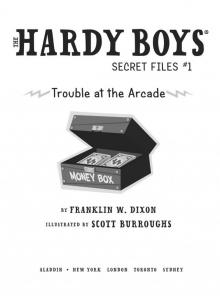 Trouble at the Arcade
Trouble at the Arcade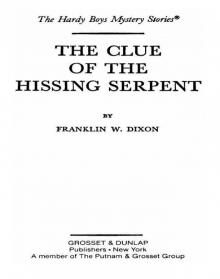 The Clue of the Hissing Serpent
The Clue of the Hissing Serpent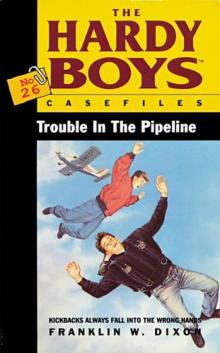 Trouble in the Pipeline
Trouble in the Pipeline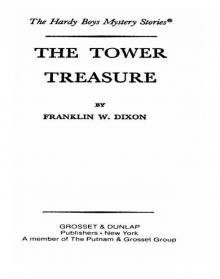 The Tower Treasure
The Tower Treasure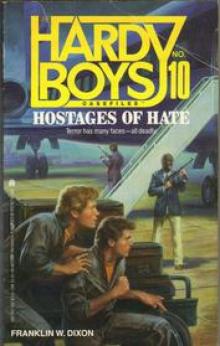 Hostages of Hate
Hostages of Hate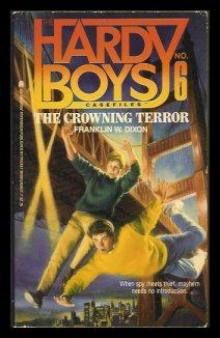 The Crowning Terror
The Crowning Terror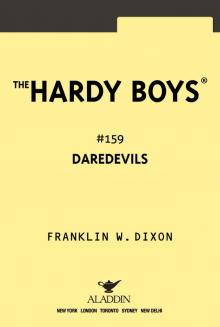 Daredevils
Daredevils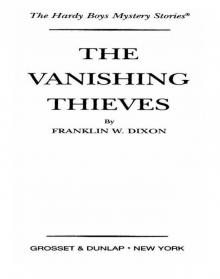 The Vanishing Thieves
The Vanishing Thieves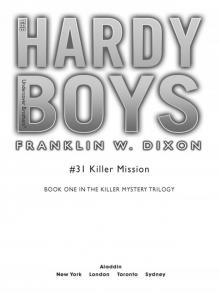 Killer Mission
Killer Mission The Mark of the Blue Tattoo
The Mark of the Blue Tattoo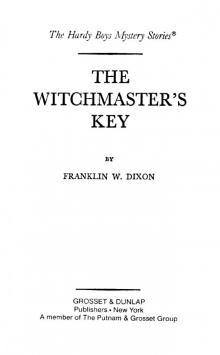 The Witchmaster's Key
The Witchmaster's Key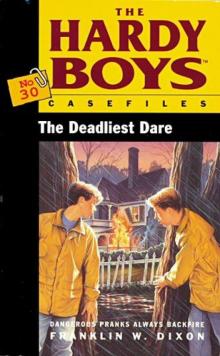 The Deadliest Dare
The Deadliest Dare Peril at Granite Peak
Peril at Granite Peak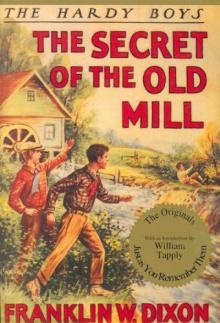 The Secret Of The Old Mill thb-3
The Secret Of The Old Mill thb-3 Rocky Road
Rocky Road The Demolition Mission
The Demolition Mission Blown Away
Blown Away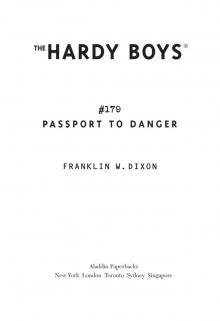 Passport to Danger
Passport to Danger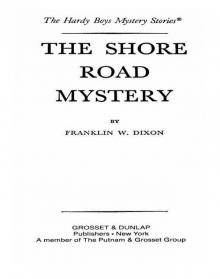 The Shore Road Mystery
The Shore Road Mystery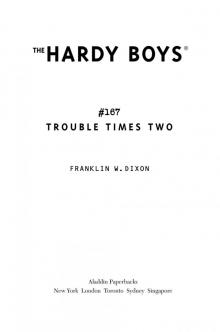 Trouble Times Two
Trouble Times Two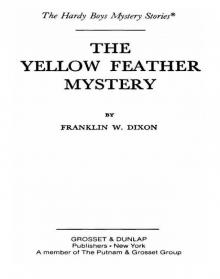 The Yellow Feather Mystery
The Yellow Feather Mystery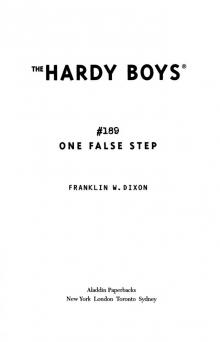 One False Step
One False Step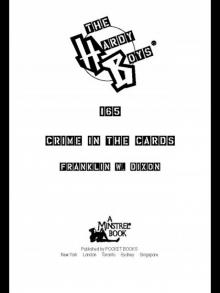 Crime in the Cards
Crime in the Cards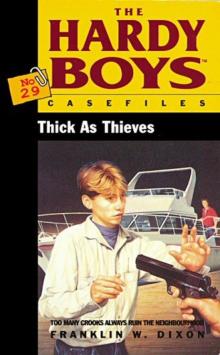 Thick as Thieves
Thick as Thieves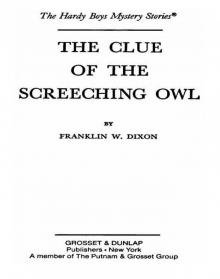 The Clue of the Screeching Owl
The Clue of the Screeching Owl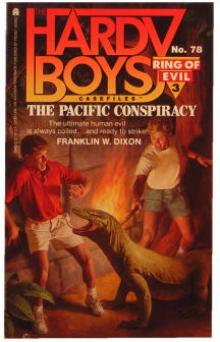 The Pacific Conspiracy
The Pacific Conspiracy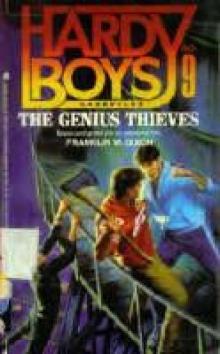 The Genius Thieves
The Genius Thieves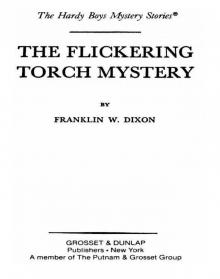 The Flickering Torch Mystery
The Flickering Torch Mystery Into Thin Air
Into Thin Air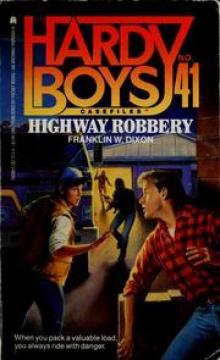 Highway Robbery
Highway Robbery Deadfall
Deadfall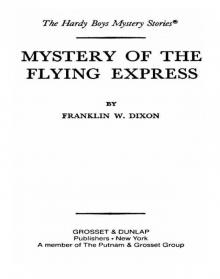 Mystery of the Flying Express
Mystery of the Flying Express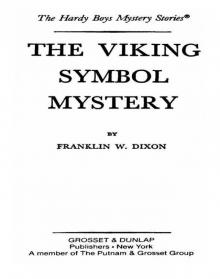 The Viking Symbol Mystery
The Viking Symbol Mystery The End of the Trail
The End of the Trail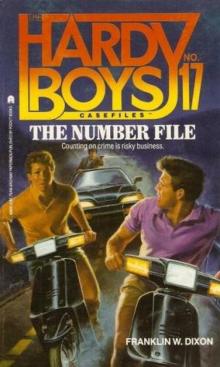 The Number File
The Number File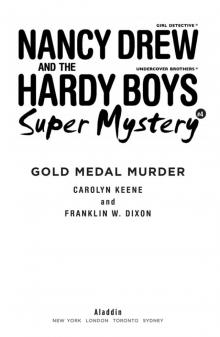 Gold Medal Murder
Gold Medal Murder Bound for Danger
Bound for Danger Collision Course
Collision Course The Madman of Black Bear Mountain
The Madman of Black Bear Mountain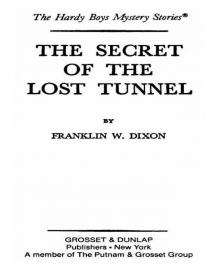 The Secret of the Lost Tunnel
The Secret of the Lost Tunnel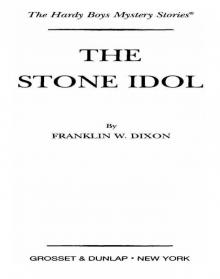 The Stone Idol
The Stone Idol The Secret of Pirates' Hill
The Secret of Pirates' Hill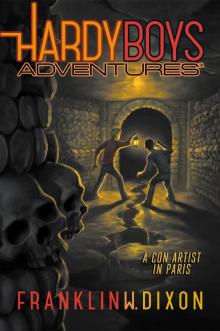 A Con Artist in Paris
A Con Artist in Paris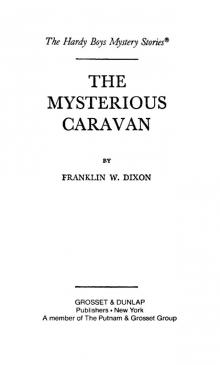 The Mysterious Caravan
The Mysterious Caravan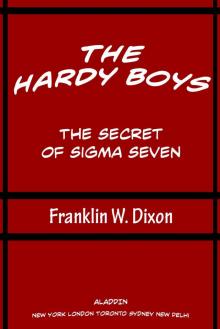 The Secret of Sigma Seven
The Secret of Sigma Seven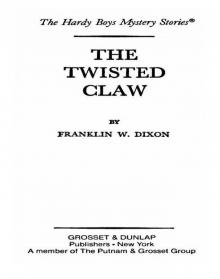 The Twisted Claw
The Twisted Claw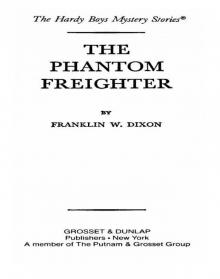 The Phantom Freighter
The Phantom Freighter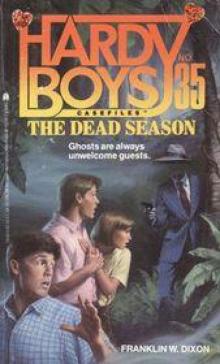 The Dead Season
The Dead Season The Video Game Bandit
The Video Game Bandit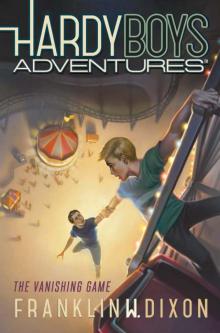 The Vanishing Game
The Vanishing Game Typhoon Island
Typhoon Island